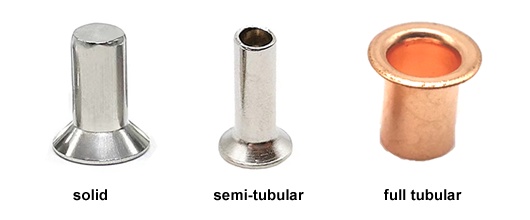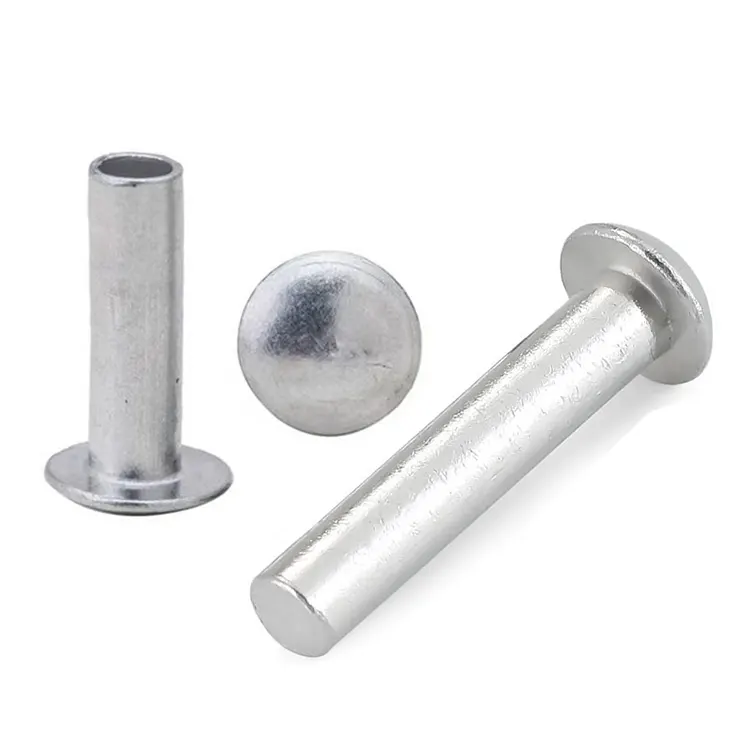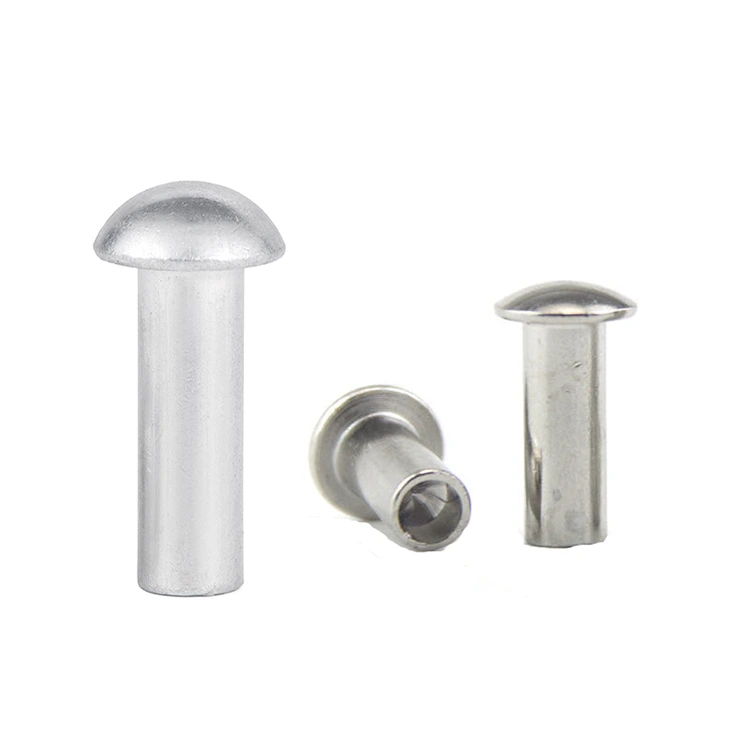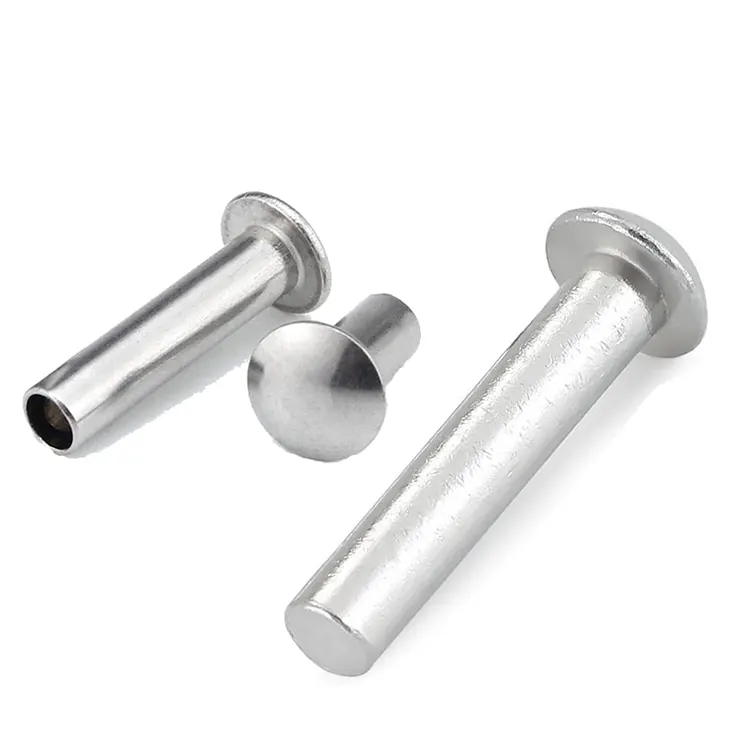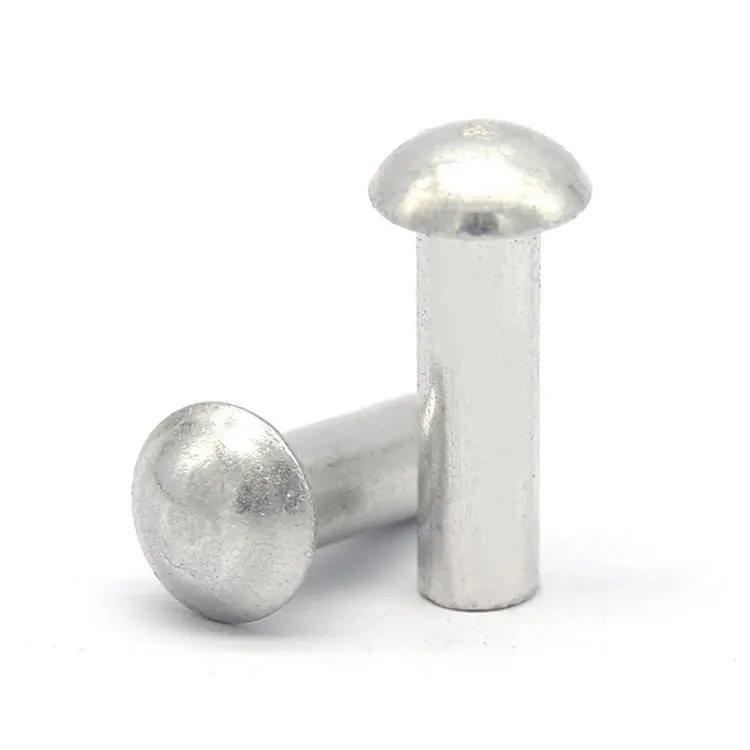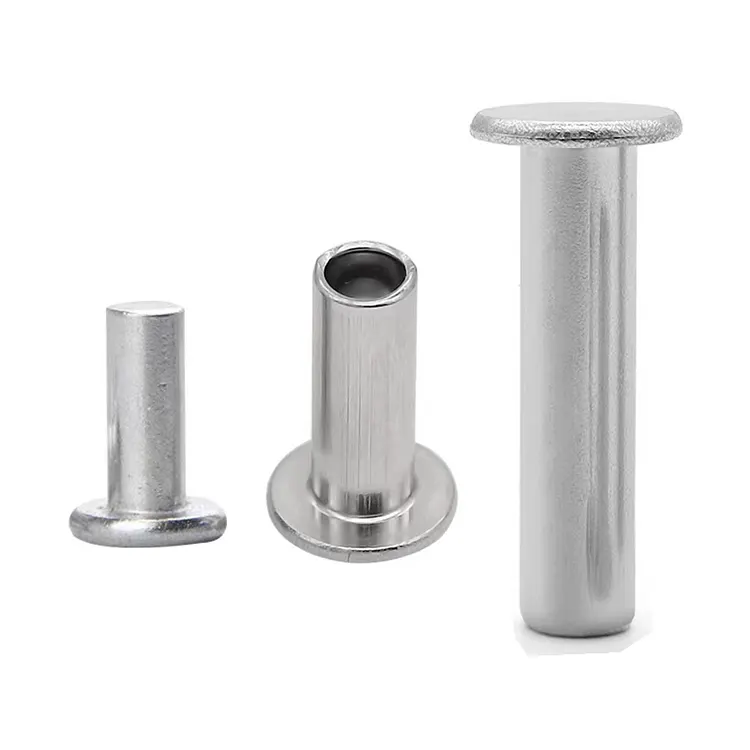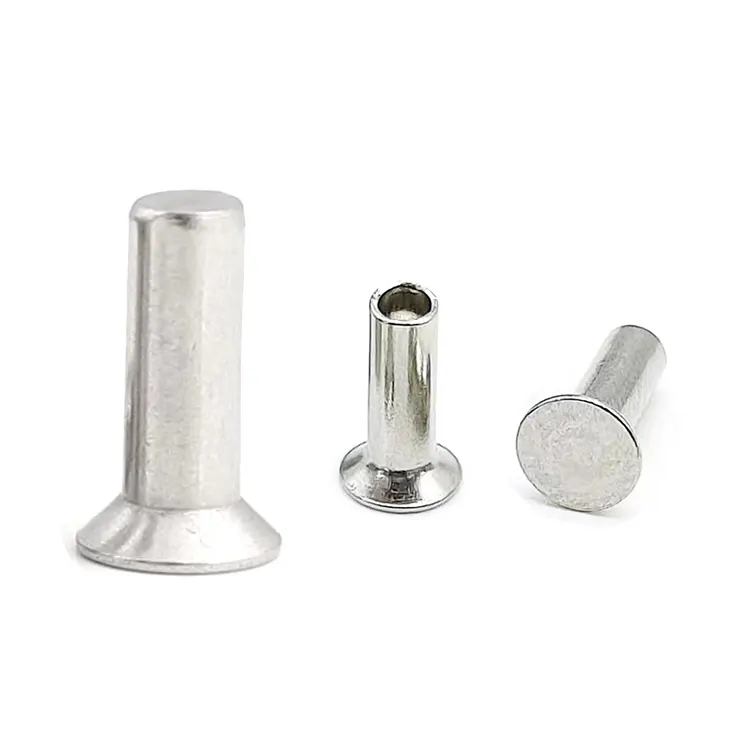Rivets
As one of professional manufacturer in China, Notin would like to provide you Rivets. And we will offer you the best after-sale service and timely delivery.
What is a rivet?
A rivet is a permanent mechanical fastener used to join two or more materials. Rivets work by inserting a metal pin into an aligned hole and deforming the end, creating a strong, secure, and durable connection. Unlike temporary fasteners like screws, rivets do not rely on threads, but instead form a permanent connection, making them ideal for applications requiring high strength, durability, and vibration resistance.
Classification of Rivets
Rivets are typically categorized by head shape, degree of hollowness, or material.
Based on head shape, rivets can be classified as flat head rivets, round head rivets, countersunk head rivets, mushroom head rivets, universal head rivets, truss head rivets, etc.

Based on degree of hollowness, rivets can be classified as solid rivets, semi-tubular rivets, or full tubular rivets.
Based on material, rivets can be classified as brass rivets, stainless steel rivets, steel rivets, aluminum rivets, copper rivets, etc.
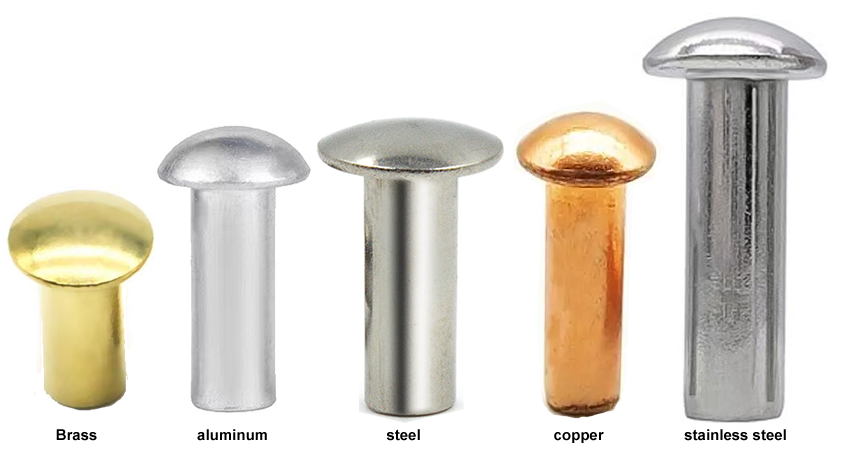
What surface finishes are available for rivets?
Rivet surfaces are typically treated with rust-proofing treatments, primarily electroplating, including zinc plating, nickel plating, chrome plating, tin plating, gold plating, and silver plating. Electroplating is a common rust-proofing method for rivets. It applies a layer of plating to the rivet surface through physical or chemical methods. The plating effectively prevents corrosion and rust, while also providing a certain aesthetic effect.
Another special surface treatment method is head coating. Head coating is performed after the rivet is electroplated. This allows for a variety of colors on the rivet head, achieving an aesthetically pleasing finish.
Aluminum rivets cannot be electroplated, but they can be anodized. Anodizing also allows for a variety of color options, but the unit price is higher than electroplating.
Rust-proofing the rivet surface is crucial, effectively extending the rivet's service life and ensuring a secure connection. Different rust-proofing methods are suitable for different environments and applications, so the choice should be tailored to the specific situation.
- View as
Rivets à tête ronde en aluminium
Les rivets à tête ronde en aluminium sont largement utilisés dans divers domaines en raison de leur légèreté, de leur haute résistance, de leur résistance à la corrosion et de leurs excellentes propriétés de connexion. Nuote Metals est un fabricant chinois spécialisé dans la production de rivets à tête ronde en aluminium. Nos rivets sont exportés dans le monde entier et nous invitons les clients à nous rendre visite pour toute demande de renseignements.
En savoir plusenvoyer une demandeRivets en aluminium
Les rivets en aluminium sont largement utilisés dans la fabrication mécanique, la construction, l'automobile, l'aérospatiale et d'autres domaines. Fabriqués en aluminium massif, ils sont légers, résistants à la corrosion et faciles à traiter. Nuote Metals est un fabricant professionnel de rivets en aluminium, y compris des rivets pleins et semi-creux, ainsi que diverses formes de tête, telles que des têtes plates, des têtes bombées et des têtes fraisées. Nous proposons une gamme complète de spécifications et accueillons les commandes personnalisées.
En savoir plusenvoyer une demandeRivets à tête cylindrique en aluminium
Comme leur nom l'indique, les rivets en aluminium à tête cylindrique sont des rivets en aluminium dotés d'une tête en forme de cuvette. Par rapport aux rivets à tête plate traditionnels, les rivets à tête cylindrique en aluminium offrent une plus grande résistance au cisaillement et à la rupture pendant le processus de rivetage. Cette méthode de rivetage est souvent utilisée pour relier des composants structurels nécessitant une sécurité et une sûreté plus élevées, comme dans les applications aéronautiques et automobiles.
En savoir plusenvoyer une demandeRivets à tête champignon en aluminium
Les rivets à tête champignon en aluminium, grâce à leurs caractéristiques légères, résistantes à la corrosion, esthétiques et pratiques, jouent un rôle important dans de nombreuses applications. Nuote Metals, un fabricant chinois de rivets, est spécialisé dans la production de rivets à tête champignon en aluminium. Nous possédons des milliers de moules pour diverses spécifications de rivets et plus de 40 machines à riveter, capables de produire des dizaines de millions de rivets par jour. Nous apprécions vos demandes.
En savoir plusenvoyer une demandeRivets à tête plate en aluminium
Les rivets à tête plate en aluminium pur sont fabriqués en aluminium pur et présentent une légèreté, une résistance à la corrosion et une excellente conductivité électrique. Ils conviennent aux applications générales à faible demande telles que les meubles, les appareils électriques et la construction automobile et navale. Cependant, la faible résistance de l'aluminium pur le rend inadapté aux applications à charges élevées. Nuote Metals est l'un des principaux fabricants de rivets à tête plate en aluminium en Chine, exportant nos rivets dans le monde entier. Nous apprécions votre visite et vos demandes de renseignements.
En savoir plusenvoyer une demandeRivets à tête fraisée en aluminium
Les rivets à tête fraisée en aluminium sont des éléments de fixation utilisés pour relier deux ou plusieurs tôles minces. Leurs têtes fraisées leur permettent d'affleurer la surface après l'installation, minimisant ainsi les saillies et les rendant adaptés aux applications nécessitant des surfaces lisses. Fabriqués principalement en aluminium, ces rivets sont légers, résistants à la corrosion et hautement conducteurs, ce qui les rend largement utilisés dans des industries telles que l'aviation, l'automobile, l'électronique et la construction.
En savoir plusenvoyer une demandeWhat are the advantages of rivets over other fasteners?
1. Ease of Installation
Rivets are fast to install, and even fully automated for high-volume applications, resulting in a simple and efficient operation process.
2. Connection Reliability
The riveting process is standardized, with strict quality control, resulting in highly stable connections. Visual inspection allows for quick verification of connection quality.
3. Vibration and Impact Resistance
Rivets connect through deformation or interference fit, providing strong clamping force and excellent vibration resistance, capable of withstanding vibration and shock.
4. Low Cost
Rivets are easy to install and can be fully automated, saving significant labor costs.
What are the advantages and disadvantages of rivets made of different materials?
Aluminum Rivets
Advantages: Lightweight, reduces overall product weight, low cost, suitable for general civilian applications.
Disadvantages: Low tensile and shear strength, unsuitable for high-strength workpieces, prone to electrochemical corrosion when in contact with metals such as stainless steel.
Stainless Steel Rivets
Advantages: Strong corrosion resistance, high hardness, suitable for high-strength workpieces (such as marine equipment)
Disadvantages: Higher cost, typically more expensive than aluminum rivets of the same specification.
Brass and Copper Rivets
Advantages: Excellent conductivity (such as connecting electronic components), good corrosion resistance.
Disadvantages: Higher cost, more difficult to process.
Steel Rivets
Advantages: High hardness, high connection reliability, and wide applicability.
Disadvantages: Compared to other materials, iron rivets are more prone to rusting.
What are the main applications of rivets?
Rivets have a wide range of uses, from small items like a pair of scissors to large items like airplanes and ships, as well as in high-precision medical applications.
Industrial Manufacturing
Rivets are used in a wide variety of industrial fields, wherever there is a need to connect two or more materials.
Electronics
Rivets secure heat sinks and chips, providing both vibration damping and noise reduction, and are widely used in the cooling systems of electronic products such as computers and mobile phones.
Automotive
Rivets are widely used to connect components of automobile bodies and chassis, such as doors and hoods. Their lightweight and corrosion-resistant properties make them an indispensable joining method in automotive manufacturing.
Aerospace
In aircraft manufacturing, rivets are used to connect different fuselage components, such as wings and tailplanes. Millions of rivets create high-strength, corrosion-resistant joints. Aluminum and titanium alloy rivets are often used to connect components of corresponding materials, ensuring stability in extreme environments.
Rivets are used everywhere. The above examples only represent a small number of their applications. We see rivets everywhere in our daily lives, such as on scissors, folding beds, and strollers etc. Rivets can be customized to different sizes and materials depending on the application.
Nuote Metals has specialized in the rivet industry for over a decade. Our factory is located in Dongguan, a city known as the "World Factory," a city with a developed industry and convenient transportation. This allows us to respond quickly when acquiring raw materials and supporting surface treatments, meeting our customers' needs for quick access to samples and bulk orders. We produce 10 million rivets daily and have molds of various specifications, allowing us to produce rivets as small as 0.8mm and as large as 10mm. We welcome your inquiries and visits.






